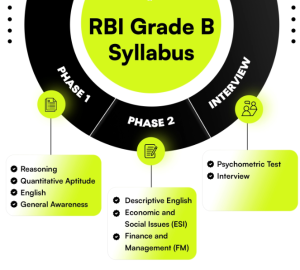RBI Grade B Syllabus: What to Focus On

If you go through the RBI Grade B syllabus for the first time, it can look confusing. There are different phases, a mix of subjects, and both objective and descriptive questions. If you are just starting your preparation, it is normal to feel unsure about where to begin. But the truth is, once you understand the syllabus properly, everything becomes a lot easier. It gives you direction and helps you focus on what really matters.
You don’t need to study everything. Many students waste time doing that and end up feeling tired and unmotivated. What works well is having clarity, knowing which topics are important, how much time each one needs, and what the exam actually expects from you. Let us help you with this. We will look at each section and talk about what you should focus on and why.
If you are serious about cracking the RBI Grade B exam, understanding the syllabus is the first smart step. Just look at it one topic at a time, and make a clear plan. And this article will help you build that plan in a simple and practical way.
RBI Grade B Exam Pattern
Before diving deep into the syllabus, let us have a look at the structure of this exam. The RBI conducts the Grade B exam in three phases:
- Phase 1: Preliminary exam (objective type)
- Phase 2: Mains exam (objective + descriptive), and
- Interview
Each phase checks a different set of skills, so your preparation needs to be planned accordingly.
Phase 1: What to Focus On
There are four sections in Phase 1: General Awareness, Reasoning Ability, English Language, and Quantitative Aptitude.
-
General Awareness
This section carries the most weight and can make or break your score. Focus on current affairs from the past six months, especially related to banking, economy, government schemes, reports, and RBI updates. Static GK is also important, but keep it limited to frequently asked topics.
-
English Language
This section tests reading and understanding. Practice reading editorials and learn how to spot grammar errors. Pay attention to comprehension, para jumbles, and vocabulary-based questions. You do not need tough words, just clarity in reading and writing.
-
Quantitative Aptitude
Stick to the basics. Focus on data interpretation, arithmetic, and number series. You do not need CAT-level questions. Practice speed and accuracy using previous year papers.
-
Reasoning Ability
Puzzles, seating arrangement, and logical reasoning are the main focus areas. Do not try to cover every single type. Instead, master 4 to 5 types of puzzles and practice them regularly.
For reasoning and quantitative aptitude the aim should not be to attempt all questions, it should rather be to focus on accuracy. Practice with sectional tests and analyse your mistakes.

Phase 2: What to Focus On
Phase 2 includes three papers:
- Paper 1: Economic and Social Issues (ESI)
- Paper 2: Descriptive English
- Paper 3: Finance and Management (FM)
-
Economic and Social Issues (ESI)
This paper has both static and current topics. Focus on current issues related to the Indian economy, government schemes, and reports. Read about topics like growth, development, poverty, education, and sustainable development. Use RBI publications, PIB releases, and simple notes to build your base.
-
Descriptive English
This is a descriptive paper where you need to write essays, precis, and reading comprehension answers. Practice writing in clear, simple language. Pick common topics like social issues, economic trends, and current affairs. Do not use fancy words. Write to express, not to impress.
-
Finance and Management (FM)
For finance, focus on basics that include financial systems, markets, and instruments. For management, focus on motivation theories, and leadership concepts. Use simple sources like NCERTs or coaching notes. The paper is concept based, so try to understand the idea behind each topic rather than memorising facts.
Interview Round: What to Prepare
Very few candidates make it to the interview stage. Here, your personality, clarity of thought, and awareness are judged.
What to focus on:
- Your Biodata Form or DAF: Be prepared to answer questions on your background, academics, work experience, and hobbies.
- RBI and economic awareness: Be clear about current economic challenges, RBI’s recent moves, inflation trends, and banking reforms.
- Opinion-based questions: You may be asked what you think about inflation, digital currency, or financial inclusion.
For this, you need to read newspapers daily. Discuss topics with mentors or peers. Mock interviews can help immensely. Stay calm, be honest, and do not bluff. It is okay to say that if you do not know something.
There is no shortcut to clearing the RBI Grade B exam, but there is a smart way to do it. Understand the syllabus deeply, focus on high-value topics, and revise regularly. Do not try to cover everything. Instead, cover the right things well.
Make a simple plan and stick to it. Give each paper the attention it deserves. If you are consistent and focused, this exam is definitely within your reach.





